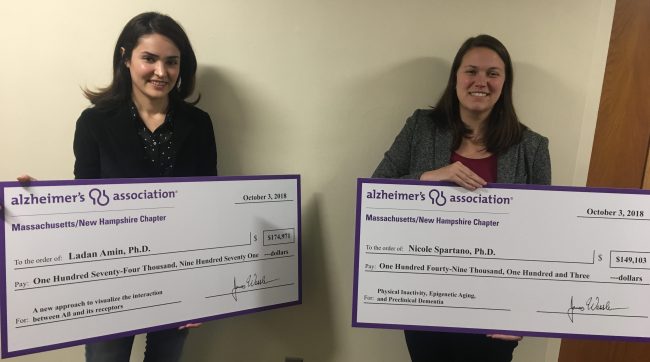Alzheimer’s Association Awards Research Grants to BUSM Investigators

Two members of the BUSM community have been recognized by the Alzheimer’s Association. Biochemistry Postdoctoral Associate Ladan Amin, PhD, has received a three-year $174,971 research fellowship and BUSM Assistant Professor of Medicine Nicole L. Spartano, PhD, was awarded a $149,103 research grant.
Dr. Amin and colleagues will aim to provide additional information on how beta-amyloid begins to accumulate and interact with nerve cells in the earliest stages of Alzheimer’s disease (AD). They plan to use a multi-disciplinary approach combining classical methods in biochemistry with the latest development in nanotechnology and super-resolution microscopy to reveal the molecular mechanisms by which several different cell surface receptors interact with amyloid beta (Aβ) assemblies. Their findings will provide deep insights into a molecular origin of disease, and will enable efforts to use these receptors as diagnostic tools for AD. “I am honored to be one of the recipients of the Alzheimer’s Association research fellowship,” said Dr. Amin. “I would like to thank the Alzheimer’s Association for this generous fellowship and support.”
Dr. Spartano and colleagues will study the links between exercise, brain health and the chemical changes that take place in DNA over time called “epigenetic aging.” By collecting data from participants of the Framingham Heart Study, Dr. Spartano will review brain scans to assess sufficient levels of physical activity to maintain brain health at different ages. Her research also hopes to identify genetic factors that may moderate the role of physical activity in brain function over time. The study aims to provide precise exercise guidelines that protect against effects of physical inactivity on brain aging and could clarify how exercise and dementia are linked. “We appreciate the generous support from the Alzheimer’s Association in funding our research and other potentially impactful studies,” said Dr. Spartano. “We also applaud this important foundation for all the critical outreach and education they provide to the community.”
The Alzheimer’s Association is the largest nonprofit funder of Alzheimer’s research in the world, having awarded more than $410 million to more than 2,700 scientific investigations since 1982. Their mission is to eliminate Alzheimer’s disease through the advancement of research, provide and enhance care and support for all affected, and reduce the risk of dementia through the promotion of brain health.